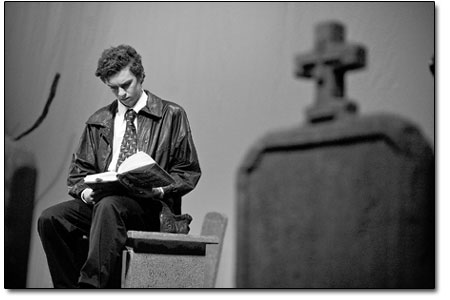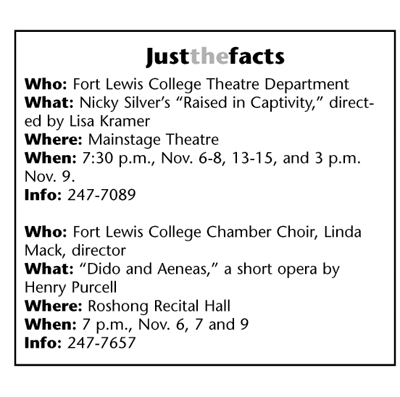|
| ||||||
| Love, fate and ties that bind
by Judith Reynolds
Boyfriend leave you? Ever think about Aeneas, the guy who left his girlfriend without even saying: “Bye, I’m going to Italy?” He’s the hero of “Dido and Aeneas,” Henry Purcell’s opera about ye old star-crossed lovers. Productions of both works open this weekend at Fort Lewis College. And both are worth a look-see. “Dido” was written in 1689, making it England’s oldest opera and a rare treat to see anywhere. In 1995, “Captivity” played on Broadway and was nominated for a Drama Desk Award. If you haven’t dipped your pinky into Theatre of the Absurd, why not now? “Raised in Captivity” Nicky Silver’s play promises to be an eye opener, one that puts us squarely in the 21st century. “The line between humor and darkness is precarious,” Lisa Kramer said in an interview last week. Kramer is directing “Captivity,” and theater major Amelia Charter is the assistant director. “Last spring,” Kramer said, “Amelia recommended ‘Captivity’ to the department’s selection committee, and it was chosen to be the first production this year.” Kramer admits that on first reading, “Captivity” scared her. “It’s not exactly a play I would have chosen, but I’m very interested in directing it. If you’re building a career as a director, you want challenges. If it’s too dark, it could be deadly. I’m trying to pull out the humor and help the cast find the humor and the meaning.” Kramer places this 1995 work in the realm of Theatre of the Absurd, “because it takes recognizable moments of reality and blows them out of all proportion.” The title suggests a zoo metaphor, and it’s applied to the American family. At rise Sebastian Bliss (Eli Halterman) sits on a bench in a cemetery by his mother’s grave. Soon his sister Bernadette Bliss Dixon (Mary Quinn) arrives; family tensions surface and heat up. Bernadette’s husband Kip (Matthew B. Mount) has his own issues. And when Sebastian visits his therapist, Dr. Hillary MacMahon (Lauren Brown), she adds more fuel to the bonfire. Dylan, a convict, and Roger, both in their early 20s, will be played by Patrick Wiabel, and Brown doubles as the mother’s ghost with even larger implications. Some actions involve self-inflicted injury. “There are elements of Theatre of Cruelty,” Kramer said. “All the characters are abusive to themselves and to others. Sometimes it’s physical. Theatre of Cruelty is a post-modern movement – confrontational and often violent.” The two-act play runs two hours plus intermission, Kramer said. “In a way, it feels like two plays. Act I is simpler; Act II takes place in the Dixon house.”
Lighting is critical, from simple drop spots for monologues or dialogues in separate areas of the stage. “I direct by light a lot,” Kramer said. “I used to design lighting, so I work with it in imaginative ways.” To say “Captivity” is about a dysfunctional family is to put it mildly, Kramer said. “The play is about being trapped, observed, controlled. That’s why the zoo metaphor works so well.” Kramer has put two scenes in the audience to underscore the element of being observed. “We may have lost a few seats,” she said, “but it’s exciting to put these scenes on platforms in the audience – one is a prison cell and the other is Sebastian’s home. It’s a story that makes you laugh and cry.” Having read the script, I can say that the playwright has integrated his wounded characters into a startling drama full of surprises. And not to give anything away, but perhaps to dispel fear, the play doesn’t end on a sour, wrenching or violent note. It is a modern work in contemporary form – for our self-absorbed culture and our troubled time. “Dido and Aeneas” Last spring, the Fort Lewis College Music Department decided it had the student talent to stage its first opera. “Dido and Aeneas” may be short, about one hour in length, but it’s the real thing. And the department has never staged a complete opera before – costumes, staging, small orchestra, et al. Here’s how it came about: Last spring at one of the regular Thursday student colloquia, junior Kelly Zick sang Dido’s lament and apparently stunned everyone in the audience – students, professors and guests. “That was the beginning,” Zick said in an interview last week. “I think the faculty realized we had the talent to stage the opera, not just sing excerpts.” In a separate interview, Linda Mack, professor of choral studies, said she knew her Chamber Choir could do the whole work, provide singers for all the secondary parts and function as the chorus. At the time, soprano Beverly Taflinger would be a perfect Belinda, and tenor Randall Stewart seemed the right choice to sing Aeneas opposite Zick.The entire work, of course, would have to be staged and memorized. Mack asked Kathryn Moller, FLC professor of drama and dance, to assist with staging. Before spring semester was over, the department ordered the music and the leads began work on their parts. “Then two weeks before fall semester,” Zick said, “we had a bombshell. Randall dropped out of the project – and announced he was going back home, for family reasons.” No one wanted to scratch the project, least of all Mack. She went on fast forward and decided to greet new faculty member, Andrew Homburg, with a proposition – virtually as he drove into town: Would you consider singing Aeneas in Purcell’s opera on Nov. 6? “My first question was, ‘How low does it go?’” Homburg recalled in an interview last week. “When Linda said ‘D,’ I knew I could do it. My Ds are not powerful, but it’s doable. And I understood the situation. What’s really important is that we, the Fort Lewis College Music Department and the Chamber Choir, are doing this. And the biggest benefit is that we all have a chance to interact with each other as who we truly are – musicians.” So the show will go on. Since the story is set in the post-Trojan War era, costuming will be simple – essentially togas. With Mack conducting from the harpsichord, a five-piece orchestra will augment the 25 singers. The set up isn’t unlike it might have been for Purcell in 1689. For opera beginners, this English baroque work will be a wonderful starting point. For experienced opera lovers, the work is technically a masque with a prologue and three acts. But the acts break into short scenes. Each of the six total scenes has its own key signature, a deliberate scheme Purcell conceived to set the tone for each. For those who love Baroque music, especially Handel, you’ll hear Handelian sounds and forms: recitatives, arias and full choruses. All in all, the music is gorgeous, clear, elegant and extremely concentrated. The story comes ultimately from Virgil and is a foundational text in the Western canon. If you need a brush up, here’s a chance to see and hear how one brilliant composer and his librettist, Nathan Tate, treated the sad tale of Dido, Queen of Carthage, and Aeneas. •
|
In this week's issue...
- May 15, 2025
- End of the trail
Despite tariff pause, Colorado bike company can’t hang on through supply chain chaos
- May 8, 2025
- Shared pain
Dismal trend highlights need to cut usage in Upper Basin, too
- April 24, 2025
- A tale of two bills
Nuclear gets all the hype, but optimizing infrastructure will have bigger impact



 Got a crazy brother? Check out Sebastian Bliss. He’s the anti-hero in “Raised in Captivity,” an absurdist drama that says something about our families and our dreams.
Got a crazy brother? Check out Sebastian Bliss. He’s the anti-hero in “Raised in Captivity,” an absurdist drama that says something about our families and our dreams.
